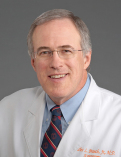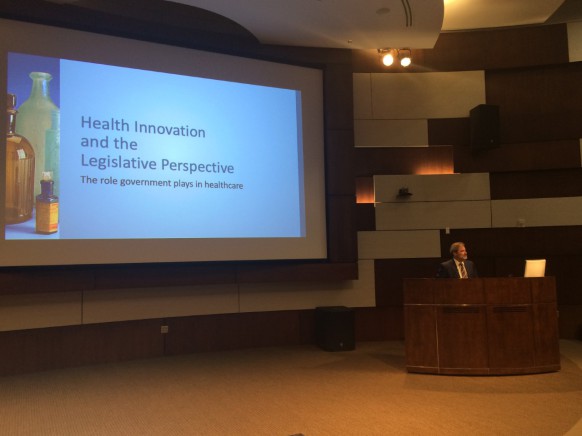
The 2019 Annual Meeting was held on the campus of the OU Health Sciences Center on February 2, 2019. Over 45 people attended the meeting. We would like to thank our Honored Guests- Dr. Charles Branch and Dr. Troy Payner- for participating in the meeting. Meeting highlights included talks on current and upcoming legislation in the state of Oklahoma by State Senator Rob Standridge. Additional topics included discussions on posterior lumbar interbody fusion, post-operative pain management, advances in meningioma management, basilar artery aneurysm surgery, and spinal balance with lordotic interbody grafts. Participants earned 4.5 hours of CME credit. Dr. Basheer Shakir assumed his position as the President of the ONS for 2019. Dr. Brad Bohnstedt was elected as the President-Elect.
2019 ONS Honored Guest- Charles L. Branch, MD
Charles L. Branch, Jr., MD received his BA degree from Oklahoma Christian College in 1977 and his
medical degree from University of Texas Southwestern Medical School in 1981. His neurosurgical training was completed at Wake Forest University (Bowman Gray School of Medicine) in 1987, and he
completed a Clinical Fellowship in the Department of Neurological Surgery at the University of California in San Francisco.
He returned to Wake Forest as a faculty member in the Department of Neurosurgery. He advanced to the level of assistant professor in 1988 and associate professor in 1993. In 2001, he was named
chairman, and was awarded the position of Eben Alexander, Jr. Professor in July of 2002.
Dr. Branch’s practice has encompassed all of spine surgery, cervical and lumbar disc disease, spinal stabilization, and spinal tumors. He has been a pioneer in the development of a posterior lumbar
interbody fusion technique that is reproducible and teachable to neurosurgeons worldwide. His early career interests in brain tumors led to the development of the Stereotactic Radiosurgery program at
Wake Forest in 1990. He serves on the editorial board of the Journal of Radiosurgery, Neurosurgical Focus, and Journal of Spinal Disorders, and is Deputy Editor of The
Spine Journal.
2019 Honored Guest- Troy Payner, MD
Dr. Troy Payner earned his undergraduate degree from the Ohio State University and his medical degree from the University of Cincinnati School of Medicine. He completed his residency in Neurological Surgery at the University of Cincinnati and a fellowship under the direction and mentorship of Dr. John Tew in vascular and skull base neurosurgery.
Dr. Payner’s practice is exclusively focused on brain disorders. In the area of neuro-oncology, he specializes in cranial base tumors, including pituitary tumors, meningiomas, schwannomas, craniopharyngiomas and chordomas. He also treats benign and malignant tumors within the brain, not involving the skull base. His expertise also includes cerebrovascular disorders such as aneurysms, arteriovenous malformations (AVMs), cavernomas, and carotid artery disease.
Dr. Payner has published many papers on topics related to the treatment of brain tumors and vascular disorders. He is an assistant professor of neurological surgery and assistant professor of otolaryngology – head & neck surgery at the Indiana University School of Medicine and has been a teacher of medical students and residents for many years. Dr. Payner has also been the director of a skull base and vascular fellowship for the past fourteen years. He has given lectures at many national and international neurosurgery meetings.
Dr. Payner became the president of Indianapolis Neurosurgical Group in 2005 and orchestrated its merger to create Goodman Campbell Brain and Spine—one of the nation’s largest independent neurosurgical groups and a model for the integration of clinical practice with academic medicine—in 2010. Dr. Payner served as Goodman Campbell’s first president until 2015 and remains on its board of directors.
State Senator Rob Standridge



